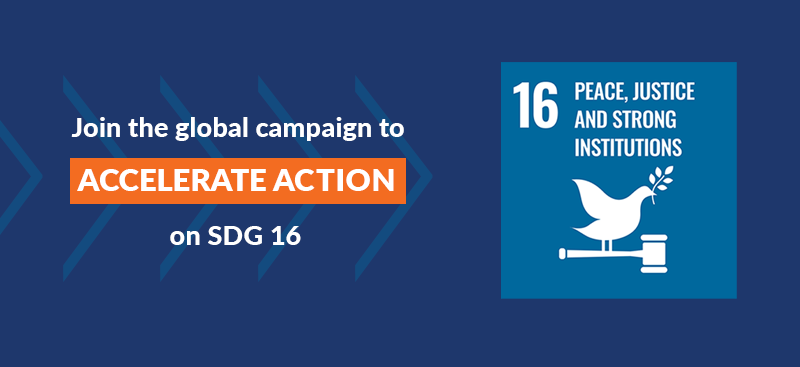

On September 24, governments, international organizations, and civil society are meeting at the UN's Sustainable Development Goals Summit to discuss how to accelerate progress toward achieving Agenda 2030. This includes commitments to build peace, justice, and strong institutions—Sustainable Development Goal (SDG) 16—as critical factors for sustainable development and to help close the glaring justice gap of over 5 billion people who lack access to justice.
As we approach the Summit, the WJP is inviting our friends and colleagues to register your own acceleration action as part of a global "Justice for All" campaign, supported by the World Justice Project and its partners, to demonstrate the contributions of civil society organizations, governments, and other stakeholders toward achieving Goal 16. "Acceleration actions" can be a project that you are already working on or projects that your organization is planning to launch soon, i.e., beyond the proposal stage.
To gather these commitments in one place, the United Nations Department of Economic and Social Affairs (UNDESA) has launched a platform to register voluntary SDG acceleration actions. To learn more and register your organization's SDG acceleration action, visit our website.
Your acceleration action could be featured on UNDESA’s website, along with WJP’s website and that of its partners.

In addition to registering an accelerated action, we are kindly asking members of our network to voice their support for an official indicator focused on equal access to justice for all, a key element of SDG 16's promise to build peace, justice and strong institutions. The deadline to act is September 8.
Collecting national data on how citizens access civil justice to meet basic needs like housing and consumer credit is critical to every country’s ability to achieve people-centered sustainable development. An estimated 5 billion people have unmet justice needs globally, including people who cannot obtain justice for everyday problems, people who are excluded from the opportunity the law provides, and people who live in extreme conditions of injustice. Yet the United Nations has not yet adopted a single civil justice indicator to help states measure progress toward SDG 16.3's target of delivering equal access to justice for all by 2030.
Now is the time to weigh in with your opinion in support of such a civil justice indicator. The UN body responsible for Sustainable Development Goal indicators (IAEG) currently is considering a series of proposals to revise and expand the official indicators used to evaluate SDG progress. In June 2019, co-custodian agencies, UNDP and OECD, jointly submitted a proposal on a civil access to justice indicator, which was developed with technical support from the World Justice Project and the Open Society Justice Initiative, to the IAEG. Unfortunately, this civil justice indicator (or any other) has not yet been included.
Please join us in voicing your support no later than September 8 for a civil justice indicator by clicking here. After you enter identifying information, you will be asked to choose one of the 17 SDG Goals. Select Goal 16 and enter your comments under 16.3. Below is suggested text for your organization to draw from.
"[I / Organization Name] was disappointed to learn that the proposed additional indicator for target 16.3 on civil justice co-sponsored by UNDP and OECD has not been included in the next phase of the IAEG-SDG Open Consultation.
While target 16.3 calls on countries to “Promote the rule of law at the national and international levels and ensure equal access to justice for all,” the two global indicators for target 16.3 that were adopted by the UN General Assembly in July 2017 as part of the SDG Global Indicator Framework both focus exclusively on criminal justice. This leaves out the everyday civil justice needs experienced by most of the population, and especially by those living in poverty and other groups most at risk of being left behind.
In the face of the glaring justice gap affecting over 5 billion people who lack access to justice, collecting data to measure implementation of the SDGs is more necessary than ever. Access to civil justice is essential for people to redress their grievances, access their rights and entitlements, and for the realization of the broader sustainable development agenda.
To advance the goal of ensuring equal access to justice for all, an additional indicator that measures access to civil justice must be added to the 16.3 framework. We urge states to support this indicator in the next stage of the IAEG-SDG indicator review process."






